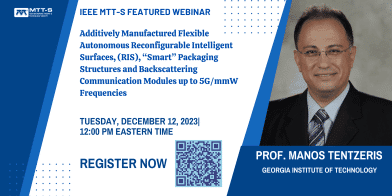
-
Tuesday, December 12, 2023 12:00 pm - 1:00 pm(New York Time) Add to my calendar
Additively Manufactured Flexible Autonomous Reconfigurable Intelligent Surfaces, (RIS), “Smart” Packaging Structures and Backscattering Communication Modules up to 5G/mmW Frequencies
Prof. Manos Tentzeris,
the School of Electrical and Computer Engineering,
Georgia Institute of Technology (Georgia Tech), USA
Abstract: Prof. Tentzeris will touch up the state-of-the-art area of fully-integrated printable reconfigurable intelligent surfaces )RIS) taking advantage of additive manufacturing and ambient energy harvesting up to 5G+/mmW frequency range. After introducing the fundamental RIS principles along with most major challenges in terms of range, power, area, frequency range, IC integrability and scalability, Prof. Tentzeris will refer to multiple RIS examples being enabled by newly reported fully printed planar lenses (Rotman, Van Atta,…) and dielectric reflectarrays enabling ultra long interrogation ranges when combined with “zero-power” backscattering interrogation techniques. This talk will address major challenges of flexible hybrid electronic implementations as well as ultra-low-power printable structures for self-diagnostic and anti-counterfeiting packages. Prof. Tentzeris will discuss issues concerning the power sources of “near-perpetual” RF modules, including flexible miniaturized batteries as well as power-scavenging approaches involving thermal, EM, vibration and solar energy forms for RIS implementations with signal modulation capabilities. The final step of the presentation will involve examples from shape-changing 4D-printed (origami) RIS for mmW wearable (e.g. biomonitoring) and Smart City applications. Special attention will be paid on the integration of ultrabroadband (Gb/sec) inkjet-printed nanotechnology-based backscattering communication modules as well as massively scalable “tile-by-tile” RFID-enabled reconfigurable intelligent surfaces.
Speaker’s Bio: Professor Tentzeris was born and grew up in Piraeus, Greece. He graduated from Ionidios Model School of Piraeus in 1987 and he received the Diploma degree in Electrical Engineering and Computer Science (Magna Cum Laude) from the National Technical University in Athens, Greece, in 1992 and the M.S. and Ph.D. degrees in Electrical Engineering and Computer Science from the University of Michigan, Ann Arbor in 1993 and 1998.
He is currently a Ken Byers Professor in the area of flexible electronics with the School of ECE, Georgia Tech and he has published more than 850 papers in refereed Journals and Conference Proceedings, 5 books and 25 book chapters. He has served as the Head of the Electromagnetics Technical Interest Group of the School of ECE, Georgia Tech. Also, he has served as the Georgia Electronic Design Center Associate Director for RFID/Sensors research from 2006-2010 and as the GT-Packaging Research Center (NSF-ERC) Associate Director for RF research and the leader of the RF/Wireless Packaging Alliance from 2003-2006. Also, Dr. Tentzeris is the Head of the A.T.H.E.N.A. Research Group (20 students and researchers) and has established academic programs in 3D Printed RF electronics and modules, flexible electronics, origami and morphing electromagnetics, Highly Integrated/Multilayer Packaging for RF and Wireless Applications using ceramic and organic flexible materials, paper-based RFIDs and sensors, inkjet-printed electronics, nanostructures for RF, wireless sensors, power scavenging and wireless power transfer, Microwave MEM’s, SOP-integrated (UWB, multiband, conformal) antennas and Adaptive Numerical Electromagnetics (FDTD, MultiResolution Algorithms). He was the General Co-Chair of the 2019 IEEE APS Symposium in Atlanta and the Chairman for the 2005 IEEE CEM-TD Workshop. He is a Fellow of IEEE, a Fellow of the Electromagnetics Academy. He is the Founder and Chair of IEEE MTT-S TC-24 (RFID Technologies). He has served as one IEEE MTT-Distinguished Microwave Lecturers (DML) from 2010-2012.